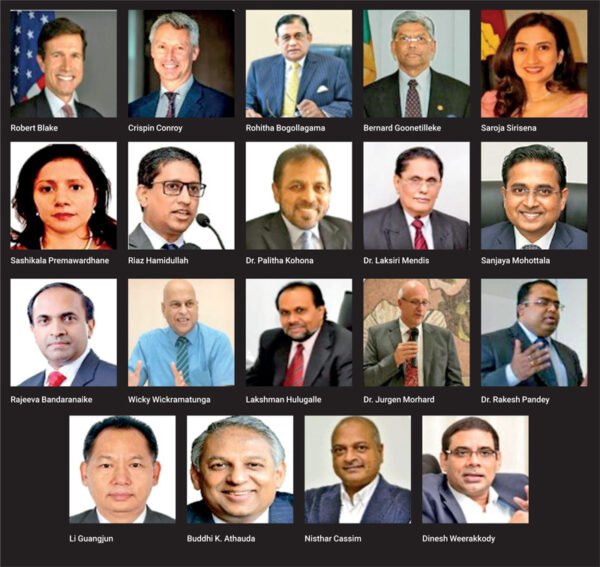
Source:FT
In an increasingly interconnected global economy, economic diplomacy has an integral role to play in foreign policy. Countries that have recognised this and adapted their foreign policy have reaped the benefits of strengthened economic and trade relations, promotion of the interests of their economy and companies, and enhanced international profile.
However, this needs to be underpinned by all of the country’s Foreign Service resources, in coordination with its public administration in order to increase tourism exports, and investments. Sri Lanka, with over 55 missions in non-Commonwealth and Commonwealth countries, 13 consulates and three permanent missions at the United Nations must maximise the impact of its economic diplomacy efforts.
To this end, the International Chamber of Commerce Sri Lanka and the Daily FT in association with Sri Lanka-China Business Council, the CSE, and the European Chamber of Commerce of Sri Lanka, organised a webinar on ‘The role of missions in promoting tourism, exports and investments’. This article encapsulates the 10 key recommendations and observations made by the speakers and panellists in this webinar.
Understand the environment
In his keynote, Robert Blake highlighted the importance of economic diplomacy for every country, observing that ‘on the ground’ staff are vital for developing connections with those interested in business. He emphasised the need to be proactive and reach out actively, ‘making sure most of the time is spent outside of the office’. He encouraged diplomats to introduce themselves to think-tanks, and Chambers of Commerce, cultivate good relationships with government decision makers and regulators in order to alleviate lack of knowledge and fear of challenges, as well as match-make with good business partners.
Crispin Conroy supported this, underscoring that getting to know home and host country business environments, their strengths and key sectors and market gaps, can create great opportunities for policy change. He noted that diplomats should meet the people and understand their business language, saying ‘talk to business, listen to business’, and citing the case study of the Australian business community in Chile who sought an ambitious commercial engagement strategy from the Australian government, which had initially prioritised Asia. Riaz Hamidullah also noted that Europe and the rest of the world are not a monolith, so ‘understanding other sides’ language and values is very important’.
Adopt a holistic approach
The speakers and several of the panellists stressed the necessity for a seamless relationship and common narrative between diplomatic missions, investment promotion agencies and national authorities with whom overseas partners would have to deal in the country. Crispin Conroy, Rohitha Bogollagama, Sashikala Premawardhane, Sanjay Mohottala, and Lakshman Hulugalle underscored how important this holistic approach and connectivity is for consistency and credibility with investors.
On engaging with the Chambers of Commerce and other business associations, Jurgen Morhard revealed that all Chambers are important partners because of their ability to leverage their membership and create fora in which awareness can be raised about a country’s trade and investment opportunities and tradeshows.
Sashikala Premawardhane and Saroja Sirisena shared success stories of opportunities created within Singapore and the UK. Sanjay Mohottala also observed that networks should be transferred when missions or commercial attachés change, rather than being the implicit knowledge of any particular individual within the service, adding that continuity, AI and CRM could be considered.
Invest in relationships
Crispin Conroy’s statement, ‘trade and investments are ongoing relationships rather than one-off transactions’ was supported by several panellists, with observations that trade must be bilateral, deepening beyond unilateral trade concessions. While they noted that the host countries were understanding of the current circumstances, trade restrictions are temporary measures and bilateral trade would need to recommence once the economy stabilises. Rohitha Bogollagama shared his experience that in challenging times with regard to Sri Lanka’s image, ambassadors kept consistently engaging with stakeholders with both those who were negative toward the country, not just with those who had positive impressions and that this brought results.
Draw on complementary capacities
Li Guangjun reflected on the need for openness and inclusiveness rather than isolation and discrimination, stating that over a hundred countries have established cooperation with China under the BRI, based on the ‘principle of extensive consultation, joint contribution and shared benefit, under win-win cooperation’.
Fielding a question on potential overdependence on one country, Palitha Kohona pointed out that Sri Lanka has invited companies from the world over to invest in various projects. He said that it just happened to be that the interest in Sri Lanka has been mainly from Chinese companies, and that a claim of overdependence would be an oversimplification. He reiterated the opportunities for business in Sri Lanka, including its location and its status as a hub in the region.
Rakesh Pandey remarked that India could be a bridge, connecting the supply chains of Sri Lankan and Indian companies, supported by complementary strengths, proximity and cultural similarity.
Most panellists noted that Sri Lanka is well-placed to be a connector within the region, forming relationships with other countries and offering access to new markets.
Train for service
In order to fulfil the demands of such multifaceted roles and meet the exigencies of the times, the guests remarked that training is critical. Bernard Goonetilleke noted that the responsibilities are quite wide and a university graduate joining the Foreign Service would not be equipped to undertake these unless provided with requisite training.
He recommended that a high value be placed on training and re-training, and that training institutions should be properly equipped, properly staffed, and properly financed to enable young diplomats to take on such responsibilities. Laksiri Mendis made the observation that the service has a good mix including digitally-oriented young people, Foreign Service personnel, and ‘outsiders’, which makes it stronger and more viable.






